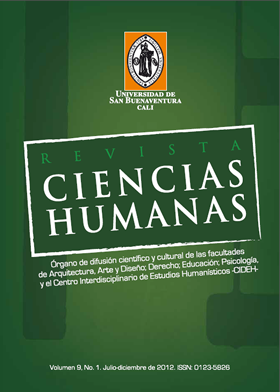The Revista Ciencias Humanas provides open and immediate access to its content, based on the principle of offering the public free access to research to aid in the greater global exchange of knowledge.
Except as otherwise stated, the content of this journal is licensed under a Creative Commons Attribution-NonCommercial-NoDerivatives 4.0 International (CC BY-NC-ND 4.0) license available at http://creativecommons.org/licenses/by-nc-nd/4.0/.
- Attribution. You must give appropriate credit, provide a link to the license, and indicate if changes have been made. You may do so in any reasonable manner, but not in a way that suggests that the licensor endorses you or your use.
- NonCommercial. You may not use the material for commercial purposes.
- NoDerivatives. If you remix, transform, or build upon the material, you may not distribute the modified material.
- No Additional Restrictions. You may not apply legal terms or technological measures that legally restrict others from doing anything the license permits.
Abstract
In this text, the author goes around the history of the Human Rights’ consolidation process in the west, considering in turn how these were interpreted and assimilated in the Colombian society during the second half of the 20th century. In this regard, the author points out some obstacles that from a socio-political point of view, have made impossible the real experience on Human Rights in Colombia.
The author concentrates his reflection on the experiential perspective of the Christian creed and its contribution to the consolidation of a culture on human rights in our country.
References
BRAUN, Herbert. (1987) 2008. Mataron a Gaitán. Bogotá: Alianza editorial.
GUTIÉRREZ, Francisco et al. (2006). Nuestra guerra sin nombre. Transformaciones del conflicto en Colombia. Bogotá: IEPRI/Norma. JARAMILLO, Jaime. (1965). Mestizaje y diferenciación social en el Nuevo Reino de Granada en la segunda mitad del siglo XVIII. Bogotá: Anuario Colombiano de Historia Social y de la Cultura.
KREIDE, Regina. (2008). Justicia global, pobreza y responsabilidad. ¿Tienen obligaciones las empresas trasnacionales?”. En: Justicia global derechos humanos y responsabilidad. Siglo del hombre. U. Antioquia, U. Católica Perú: 110 y 130.








